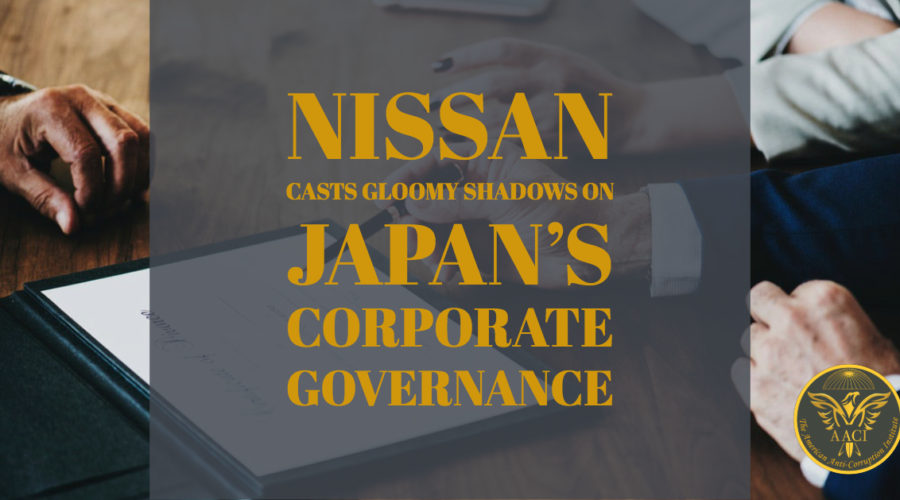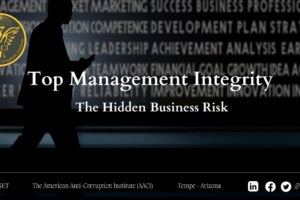November 23, 2018
By Mike J. Masoud, CPA, CACM, CFE, MBA
Japan Inc. corporate governance is hit hard by the Nissan scandal. On November 19, 2018, Nissan Motor Co., Ltd issued a statement asserting in it many significant matters that, as I believe, led to the arrest of Nissan’s Chairman Carlos Ghosn and Representative Director Greg Kelly by the Japanese Public Prosecutors Office. Nissan’s statement reveals the following issues:
- It all started with a whistleblower report. Again and again, whistleblowing proves to be the most effective means to uncover misconduct, fraud, and corruption.
- Nissan has been conducting an internal investigation about allegations of misconduct by its Ghosn and Kelly.
- Nissan’s found that its Chairman, Ghosn, under-reported his compensation in documents filed with Tokyo Stock Exchange and used company assets for personal use.
- Nissan’s communicated the findings of its internal investigation with the Japanese Public Prosecutors Office.
- Nissan expressed its sorrow for the breakdown in its governance and compliance systems.
On November 22, 2018, Nissan’s board unanimously decided to ”
- To discharge Carlos Ghosn as Chairman of the Board
- To discharge Carlos Ghosn as Representative Director
- To discharge Greg Kelly as Representative Director
- To study the creation of a special committee to appropriately take advice from an independent third party regarding the governance management system and better governance of director compensation. Further to the mandate, the three independent directors – Masakazu Toyoda, Keiko Ihara and Jean-Baptiste Duzan – will lead this matter.
- To approve establishment of an advisory committee chaired by Masakazu Toyoda and including Keiko Ihara and Jean-Baptiste Duzan. The committee will propose nominations from the board of directors for the position of Chairman of the Board. “
But what led Ghosn to commit all these alleged misconduct? The real answer shall come later form Ghosn himself, Kelly, and others. The debacle is still in its early stages and court hearings and decisions will eventually uncover many unknown facts, as of today. Though I want to comment on Nissan’s governance and compliance failure.
Governance and Compliance Failure
Excessive Power of the Chairman
According to Bloomberg,
“Mitsubishi: Japanese carmaker; To vote on dismissing Ghosn as chair; Nissan holds 34% of Mitsubishi.
Renault: Based in France; Ghosn serves as CEO; Nissan owns 15% of Renault.
Nissan: Based in Yokohama-Japan; Seeks to oust Ghosn as chairman; Renault owns 43% of Nissan.”
I believe that when Ghosn serves as a Chairman of Mitsubishi and Nissan and as a CEO on Renault, it constitutes an explicit superpower. What are the governance mechanisms in all these companies that are used to check on this superpower of Ghosn? What is clear to me is that Nissan admitted to its governance and compliance failure. The question that pops up is the tone Ghosn set at all these companies!
The Composition of the Board
I believe that the composition of Nissan’s board did not deliver in checking on its chairman’s alleged abusive acts. I am afraid that Ghosn dominated its board for a long time. When a chairman dominates its board, board members independence and compliance with good governance practices become ineffective.
Nissan’s Culture and the Tone Set at the Top
What is frightening is the nature and attributes of the culture Ghosn instilled at Nissan. It is too early to tell. This line of thought leads to another significant governance question: what is the impact of Ghosn on the culture of Mitsubishi and Renault?
Where Were the Auditors?
This is the question that Nissan’s shareholders and stakeholders shall ask soon. Ghosn’s alleged misconduct occurred over many years. Were the auditors negligent or grossly negligent? We will probably read headline news about this significant issue as the scandal unfolded.
Finally, it seems to me that Ghosn is a victim of his success and lack of oversight by the boards he chaired, companies he led, and regulatory agencies. If it happens in Nissan, it happens elsewhere, especially in developing countries!
Regulators of all countries should learn from the Nissan scandal. Corporate governance and compliance are not slogans, they are realities that make or break companies and even nations. I hope that it is apparent that good governance is a prerequisite for the fight against abuse of power: fraud and corruption.
Mike J. Masoud, CPA, CACM, CFE, MBA is the Sr. Director of The American Anti-Corruption Institute (AACI) in the Middle East and Africa. You can reach him at Mike@THEAACI.com
Related news.











































